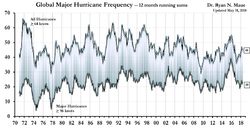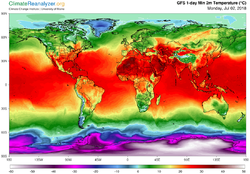Miami has seawater in the streets on a regular basis[/QUOTE
Miami has lived with their "King Tides" for many years. Left out of the discussion are two factors, subsidence and simple heavy rain. many of the worst visual examples we are presented with are combinations of all three together. the only regular thing about King Tides is they usually occur in the fall and are forecasted. that is I guess brings the referral to, "regular basis"
https://speakingofgeoscience.org/2017/02/22/coastal-subsidence-harbinger-of-future-flooding/
"Wildfire seasons are getting longer and doing a lot more damage as heat waves get longer and hotter. "
while longer and more damage maybe accurate, much less area is burning>
then we have this from Climate central
which graph is true? I really don't know! anybody else got the answer?
one thing I'll agree is that so many fires are found to be started by a person making them "man made"
once again I sit on the more than one thing answer, natural and man made. which one has more weight, C02 or sun/moon gravity, subsidence, combined with on going sea level rise. I've mentioned Doggerland before in other posts, always a good reminder.
https://www.nationalgeographic.org/maps/doggerland/




